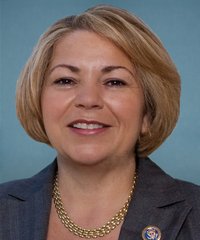
A former labor lawyer, Linda T. Sánchez represents California’s 38th congressional district – but the first thing her family and friends will tell you is that she’s never stopped “kicking ass for the working class.” Most of all, she is also a proud mom, dog lover, and Dodgers fan.
Elected to the U.S. House of Representatives in 2002, Sánchez is the first Latina to serve on the powerful House Committee on Ways and Means and the House Judiciary Committee. A lifelong progressive, Sánchez has devoted her career to helping working people get ahead: advocating for families, improving America’s education system, and bringing jobs to Southern California.
A good education can open up many opportunities. As a daughter of immigrants, I am a living testament to the power of education. I believe every child has access to the highest quality education, which prepares them to be competitive in today’s globalized economy. I am committed to ensuring our nation makes the right investments in education to provide future generations with the tools they need to achieve their goals.
As the mother of a young son, I strongly believe when students are safe at school and receive adequate support to meet the challenges they face, they are more likely to stay in school and to thrive there. That’s why I have introduced several bills that will help make schools safer, more stable places for students to grow and learn.
Students cannot learn when they are shamed, intimidated, or in fear for their physical safety or emotional distress. To help all children succeed in school, we must recognize that bullying is not just “kids being kids.” It is harmful and damaging behavior that must be taken seriously. More than one in five children in America will be bullied either at school or online, and seventy percent of students say they have witnessed bullying in their schools. Bullying contributes to decreased academic achievement, including high dropout rates and increase absenteeism, and physical and psychological issues.
Current federal law provides funds to promote school safety but does not expressly focus on issues of bullying or harassment. As a condition of receiving future Safe Schools funding, the Safe Schools Improvement Act would require schools and districts to ensure that their codes of conduct specifically prohibit bullying and harassment and would require states to include bullying and harassment data in their state-wide reporting. The legislation would also allow schools to train faculty and staff on how to prevent bullying and address it effectively when it does occur.
I have introduced this bipartisan legislation since 2007. It is widely supported by my colleagues and over 70 outside organizations, like the Human Rights Campaign, GLSEN, National Association of School Psychologists, National Education Association, and more.
The average student-to-counselor ratio in California’s public schools is 644 to one, a ratio that hardly allows for individual attention and intensive support. Unfortunately, in California, counselor-to-student ratios are almost always determined by the overall student population of a school, rather than by the number of students at risk of dropping out. School counselors are an integral part of the effort to increase graduation rates because they can identify potential problems early in a student’s school career.
That is why I introduced the Put School Counselors Where They’re Needed Act, which would address this problem by providing funding for additional counselors in high schools with high drop-out rates. These additional counselors would work intensively with students at risk and would collaborate with parents, teachers, and others to create a comprehensive plan to get these students back on the right track.
In addition to this legislation, I introduce a resolution each year that honors and recognizes “National School Counseling Week.” School counselors play an important role in shaping the lives of our young people. They can often identify and intervene in an issue before a student drops out, and provide necessary, multifaceted support to students who need it the most. School counselors also help guide and encourage students in achieving the dream of going to college, and help others identify an alternative path that works for them.
Expanding access and affordability to secondary school is another issue I am working hard to improve. Student loan debt has reached an astonishing $1.5 trillion and is crippling young college graduates who are trying to start their post-college lives. Hard working young adults shouldn’t have to start life already behind, which is why I have been a proud cosponsor of the Democratic proposal to reauthorize the Higher Education Act. The College Affordability Act is a comprehensive piece of legislation that would tackle the rising cost of tuition and increase federal student aid.
In prior Congresses, I have worked with some of my colleagues to introduce the America’s College Promise Act. This legislation would provide grants to states to make the first two years of community college completely free. Opening up the door to an education so many Americans want, but many may not have the means to achieve. I am proud to say that this legislation was included as part of the College Affordability Act.
As we continue working to pass comprehensive legislation, I have worked with my colleagues to pass smaller bills that would provide immediate relief to students. In 2017, I introduced the All-Year Access Act with Rep. Lucille Roybal-Allard (D-CA) to restore the year-round Pell Grant eligibility which was eliminated in 2011. This legislation was signed into law by the President in 2017.